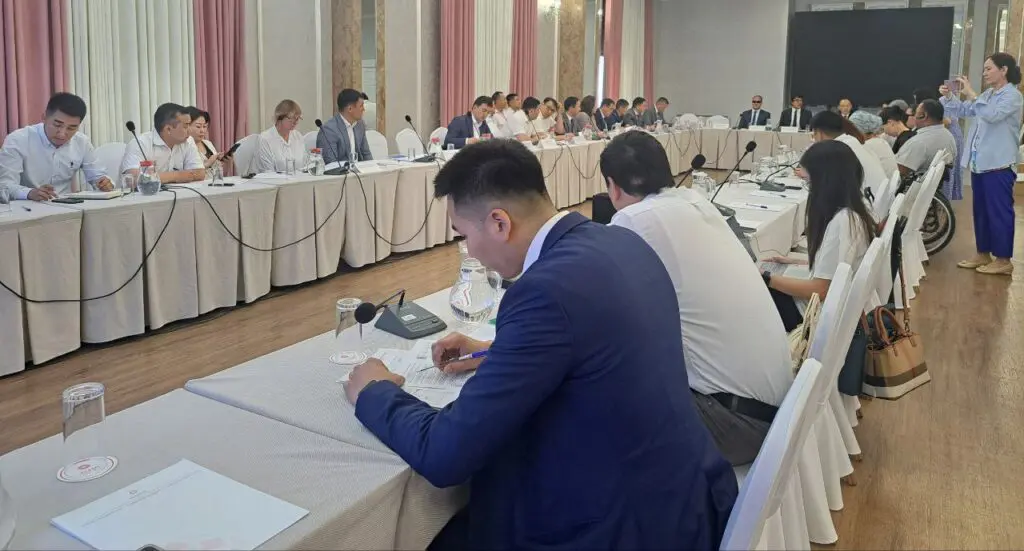On June 4, 2024, the InKoom project team participated in the latest meeting of the Council for Disability Affairs under the Cabinet of Ministers of the Kyrgyz Republic.
The meeting was attended by Edil Baysalov, Deputy Chairman of the Cabinet of Ministers of the Kyrgyz Republic, Chyngyz Mamatbek uulu, Deputy Minister of Labor, Social Protection, and Migration of the Kyrgyz Republic, Tolkunbek Isakov, Deputy Chairman of the Council, representatives of the State Agency for Architecture, Construction, and Housing and Communal Services, the Kyrgyz State Agency for Natural Resources and Ecology, the Ministry of Technical Control, the mayors of Bishkek and Osh, the Prosecutor General’s Office of the Kyrgyz Republic, and civil society representatives.

During the meeting, issues related to the accessibility of infrastructure and public transportation for people with different forms of disabilities were discussed.
In his speech, Deputy Chairman of the Cabinet of Ministers of the Kyrgyz Republic Edil Baysalov noted that there is a State Program called “Accessible Country” for people with disabilities and other mobility-impaired groups in the Kyrgyz Republic for the years 2023-2030. The program focuses on 6 priority areas: optimizing the medical and social disability expertise, rehabilitation and habilitation, accessible education, accessible labor markets, and modernizing the prosthetics and orthotics system. New buildings, social facilities, and roads are being constructed in the cities of Bishkek and Osh. There are other regions as well. Our two capitals are examples of the correct use of new infrastructure standards and technologies, including uniform public transport, audio-graphic and textual media, comfortable seating, etc. Since this Council is under the Cabinet of Ministers, it should be held at the Cabinet of Ministers’ office. However, there are no conditions for that here. This can be called “absurd.” By the end of this month, the new building for our President will be ready. Perhaps we will hold our next meeting there.

Deputy Chairman of the Council, Tolkunbek Isakov, said: “At the council meetings, various pressing issues related to people with disabilities are discussed. I am far from saying that the issues being discussed will not progress. Of course, speed is not what we need. But there are changes. For example, the Ministry of Education is one of the most important ministries. Education is crucial for people with disabilities. The more educated a person with a disability is, the less burden there will be on the state. Recently, the Ministry of Education put out for public discussion a list of several diseases that in the new draft also affect people with disabilities. For example, people with glaucoma and musculoskeletal disorders. This is a discriminatory project. Article 24 of our Constitution clearly states that people should not be discriminated against based on disability. Secondly, in 2019, we ratified the Convention on the Rights of Persons with Disabilities. According to the convention, people with disabilities have the right to full participation in public life,” he said.
At the meeting, the State Agency for Architecture, Construction, and Housing and Communal Services under the Cabinet of Ministers of the Kyrgyz Republic, the Ministry of Natural Resources, Ecology, and Technical Control of the Kyrgyz Republic, the Bishkek and Osh city administrations, the General Prosecutor’s Office of the Kyrgyz Republic, and the Ministry of Transport and Communications presented a report on the accessibility of infrastructure and public transportation for people with disabilities.

After that, activists from organizations advocating for the rights of people with disabilities asked representatives of ministries questions about the accessibility of transportation and infrastructure. Additionally, proposals were made to improve the accessibility of infrastructure and transportation for people with disabilities.
